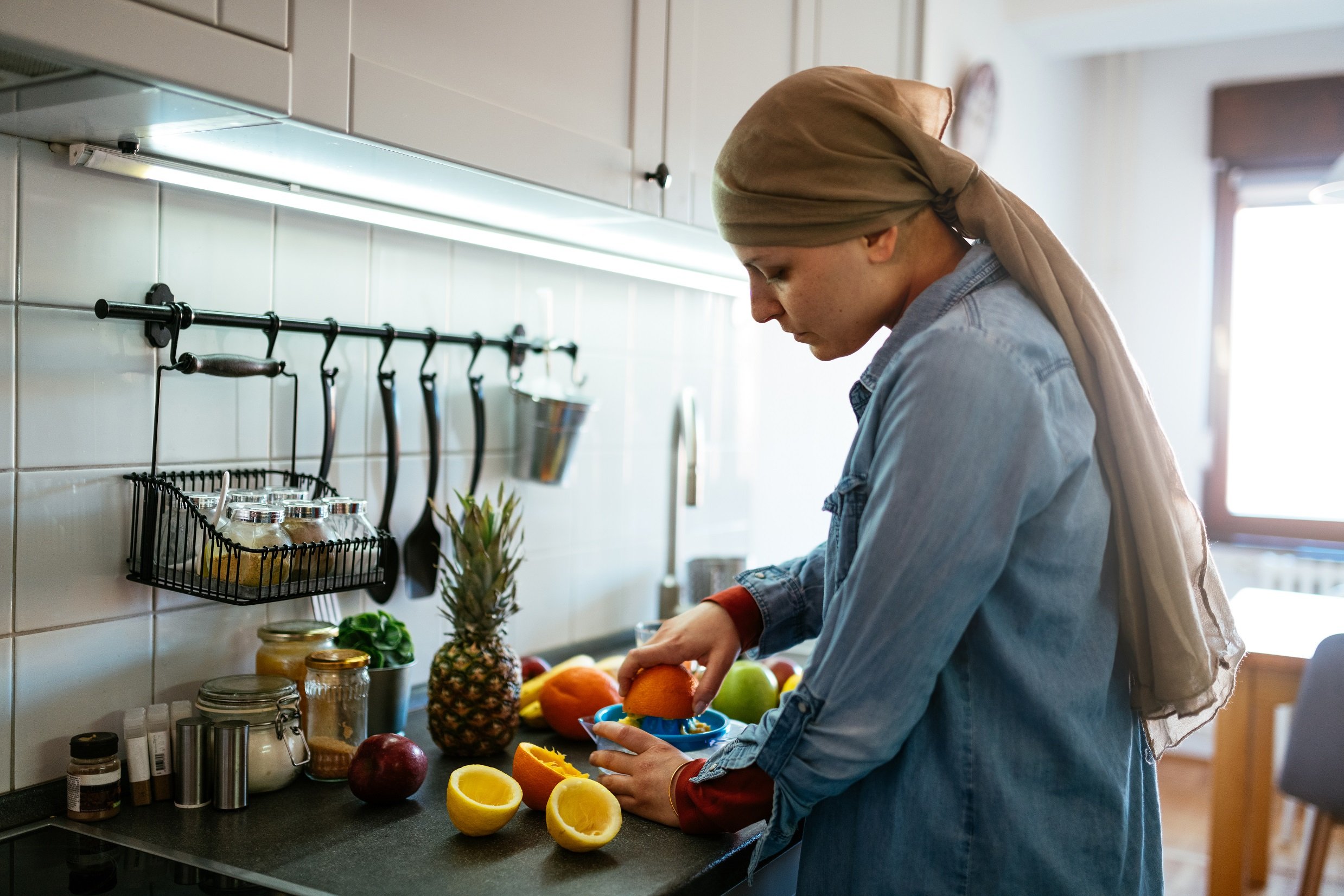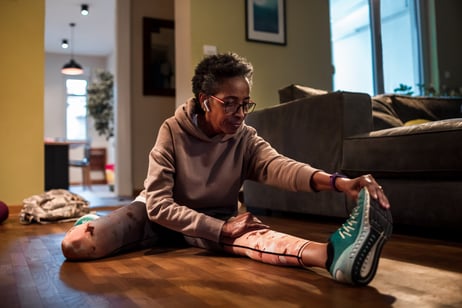5 Ways to Keep Your Immune System Healthy After Cancer Treatment
5 min read

Cancer treatments, especially chemotherapy, can weaken your immune system. While chemotherapy doesn’t permanently damage your immunity, it can take anywhere from weeks to months after cancer treatments are over for you to get a healthy immune response back. To help you best recover and heal, discover how to protect yourself from disease during and after cancer treatment with these five recommendations from Rocky Mountain Cancer Centers (RMCC).
1. Healthy Eating
One of the most important things you can do to boost your immune system is to nourish your body with healthy food. Eating well helps you recover and heal faster from cancer treatments, and it can also help you keep up your strength and energy during other aspects of cancer care.
The Dietary Guidelines for Americans recommend plenty of fruits and vegetables, lean proteins, whole grains, and fat-free or low-fat dairy. Eating healthy also means limiting added sugars, saturated fats, and sodium, but it’s best to avoid them altogether.
Healthy eating is critical in keeping your immune system healthy by providing vitamins and minerals the body’s immune system needs to function at its best. For example:
- Vitamin A – Vitamin A contributes to developing and regulating your immune system. It also helps keep your skin and tissues healthy. Foods that are high in vitamin A include carrots, broccoli, spinach, sweet potatoes, red bell peppers, and eggs. Some milks and cereals are also fortified with vitamin A, as indicated on the nutritional label.
- Vitamin C – Known as an antioxidant, vitamin C helps protect cells from free radicals such as cigarette smoke, air pollution, etc. Vitamin C also helps form antibodies and plays other important roles in the immune system. You can find vitamin C in strawberries, papayas, red bell peppers, and citrus fruits, such as oranges, tangerines, and grapefruit.
- Vitamin E – Vitamin E is an antioxidant, as well, but this vitamin also helps cells communicate with each other and prevents blood clotting. To get vitamin E, eat almonds, vegetable oils such as sunflower and safflower oils, and green vegetables such as spinach and broccoli.
- Zinc – The immune system could not function properly without zinc. This nutrient helps with making cells and healing wounds, and it helps fight bacteria and viruses. Zinc can be found in oysters, animal protein such as red meat and poultry, beans, nuts, whole grains, and dairy products.
While healthy eating is important for cancer patients, your treatment may have left you without much of an appetite. Try to eat at least a couple of bites of something nutrient dense every couple of hours instead of waiting for your body to tell you that you're hungry. If you know your cancer treatments leave you feeling fatigued afterward, try cooking and freezing your meals in advance so you have easy access to healthy meals and snacks.
We don’t recommend taking nutritional supplements without first talking to your cancer care provider.
2. Regular Exercise
 Regular exercise can boost your immune system. For most cancer patients, physical activity is safe and can also improve your quality of life and increase energy. If your cancer treatments leave you feeling fatigued, it’s possible that exercise could help. Exercise can also lower anxiety and depression. Cancer survivors who are physically active have a lower risk of cancer recurrence than those who don’t exercise.
Regular exercise can boost your immune system. For most cancer patients, physical activity is safe and can also improve your quality of life and increase energy. If your cancer treatments leave you feeling fatigued, it’s possible that exercise could help. Exercise can also lower anxiety and depression. Cancer survivors who are physically active have a lower risk of cancer recurrence than those who don’t exercise.
The general recommendation for physical activity is 150 minutes of moderate-intensity aerobic activity per week, 75 minutes of vigorous aerobic activity per week, or a combination of the two. Aerobic activity is anything that gets the heart pumping, such as walking, cycling, dancing, or group exercise classes.
Find something that you enjoy that increases your heart rate. If you can, try to do it for at least 150 minutes per week. You should also try to fit in two days per week of muscle strengthening activities, such as lifting weights or bodyweight exercises.
You may find it difficult to reach the 150-minute goal during treatment – and that’s okay. If you’ve never exercised before, start slowly and build up your strength. This might mean you can only fit in 10 minutes of light exercise daily.
On the other hand, if you’re used to physical activity, you might find that you’re unable to exercise like you used to and need to scale back your typical routine. Either way, it’s important not to push yourself too hard. Also, if you’re experiencing symptoms that could increase your fall risk, such as dizziness, blurred vision, or any numbness or swelling in your legs or feet, don’t exercise.
If you’re having trouble getting any physical activity, talk to your cancer care provider.
3. Reduce Stress
We know that cancer recovery can be stressful, but as much as you are able, try to reduce your stress. Chronic stress wreaks havoc on the body and can suppress your immune response.
When we are stressed, our bodies release hormones. One of those hormones – corticosteroid – can weaken the immune system by lowering the number of immune cells. Chronic stress can also make negative feelings more intense, decrease your appetite and energy, and cause difficulty sleeping – all of which is bad for your healing and recovery.
Here are a few healthy ways to reduce your stress:
 Connect with family and friends
Connect with family and friends- Join a cancer support groups
- Eat healthy
- Exercise
- Do a hobby you enjoy
- Meditate
- Practice deep breathing
- Take a walk in the woods or other natural setting
4. Prioritize Sleep
Not getting enough sleep can have negative health impacts, including greatly reducing immunity. According to the Centers for Disease Control and Prevention, a modest amount of sleep loss can result in up to a 50% decrease in immune response.
Most adults need seven to nine hours of sleep per night. Cancer and its related treatments can cause stress or side effects that make it difficult to sleep. To help you get as much sleep as possible, try these habits:
- Avoid caffeine six hours before you go to bed.
- Keep your bedroom dark and at a temperature you like.
- Stay away from your phone, computer, TV, and other screens before bed.
- Go to bed at the same time every night, including on weekends to keep on a routine.
If you’ve tried everything and still can’t sleep, talk with your cancer care provider about available options.
5. Avoid Alcohol and Tobacco
Both alcohol and tobacco weaken the immune system.
Alcohol can limit your body’s ability to fight infection and cause damage to organs. While it’s best to avoid alcohol altogether if you do choose to drink, drink in moderation. For women, this is one drink a day or less, and for men, moderate drinking is two drinks a day or less.
Smoking can harm every organ in the body and cause an increased risk of heart disease, diabetes, stroke, and other chronic diseases. If you smoke or use other forms of tobacco, you should quit. If you’re struggling to quit tobacco, talk to your cancer care provider.
For a calendar of our events, such as support groups, exercise classes, or educational classes, visit RockyMountainCancerCenters.com/Events.